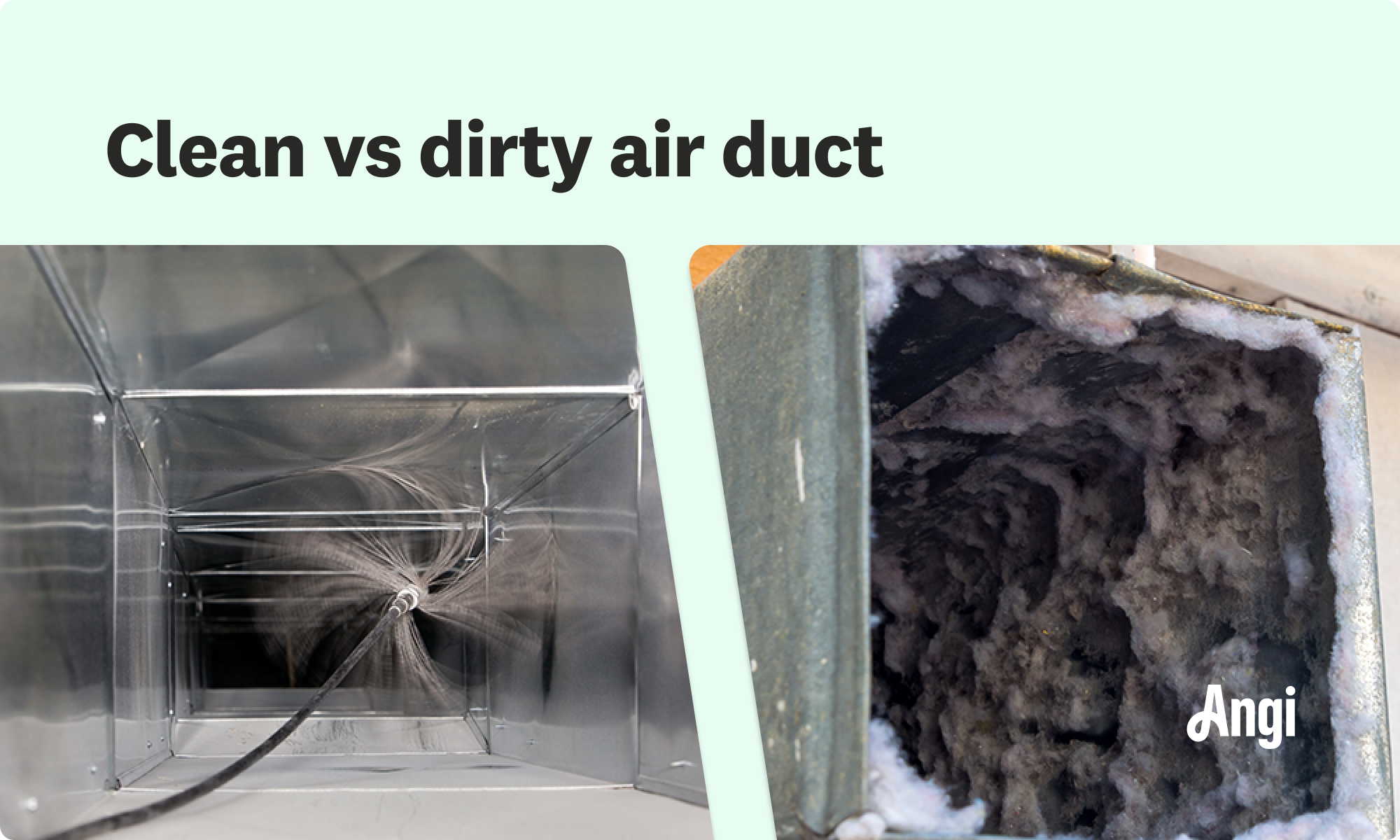
Whole-house air purifier costs depend on a variety of factors, including your home’s size and layout. The type of purifier you choose matters, too.
Brush up on these warning signs


Signs of dirty air ducts include bad-smelling air, clogged HVAC filters, and dirty vent covers.
Experts recommend cleaning your air ducts every 3 to 5 years or as needed rather than as routine maintenance.
Clean your air ducts after a large renovation or pest infestation.
Air duct cleaning costs an average of $390 and should be handled by a pro to avoid causing damage.
No one likes breathing in dirty air, and clean air ducts are a great way of clearing out unwanted dust flying around your home. While air ducts are important to maintain, it can be difficult to know when exactly to clean them. This guide will help you spot the signs of a dirty air duct so you know when to call a pro.
Air duct cleaning is only necessary in certain circumstances or if the ducts show any major signs of damage. The EPA has found that regularly cleaning your air ducts doesn’t have the health benefits that many air duct cleaning companies claim, but it’s worth doing after a major renovation or pest infestation.
Experts recommend routine inspections of your air ducts if you have a wood-burning furnace, stove, or fireplace and to complete duct maintenance before each heating season to protect against carbon monoxide poisoning.

Here are some signs you should call a local air duct cleaner.
While duct cleaning is often associated with dust, mold growth within your vents is actually way more harmful and should be dealt with swiftly. Depending on the type of mold that’s infested your air ducts, it could cause some serious health issues. Most of the time, you can’t see mold because it’s deep in the ductwork, so watch for these signs:
Bad-smelling air
Allergic reactions
Water damage or leaks
Reduced airflow
Air ducts are a prime location for pests in your home, such as insects, mice, or rats. Dander, droppings, bacteria, and other viruses can pass through your air ducts and cause serious health problems. If you’ve had a recent pest infestation, hire a pro to clean your ducts—after the pest control expert has taken care of the infestation—to ensure you’ve thoroughly erased any trace of them.
A clean home often indicates clean air ducts, but the inverse here is also true. Your vents shouldn’t ever expel dust, so if you’re noticing more dust than usual around your duct vents, it’s usually a sign of a buildup in the ductwork.
Your air vents are a vital part of your HVAC system that help air flow through your home efficiently, so a buildup of dust and debris is a big hindrance. A blocked air duct can cause:
Higher energy bills
Reduced airflow
Strange noises throughout the ducts
Clogged air filters
Clean ducts will ensure your HVAC stays working for years, avoiding unnecessary repair costs.
While contractors won’t leave a major mess, the dust from any major home renovations can clog your air vents. Also, if you’ve moved into a new build or a home with no record of prior duct cleaning, you may want to consider a duct inspection to see if any cleaning or maintenance is required.

Most duct cleaning professionals start with an initial inspection to determine if there are blockages in your HVAC system and ducts. Once they’ve assessed the blockages and prepared your home, pros will use specialized tools like high-powered vacuums, brushes, and agitation devices to eliminate any contaminants.
After clearing out debris, they may use specialized sanitizers that prevent microbial growth within your HVAC system. Then, your pro will conduct a final inspection to ensure your vents are good to go.
Note that if your duct cleaner finds significant mold inside your ductwork, you may need to hire a mold remediation specialist, which can cost up to $10,000 if the problem is severe.
The cost of cleaning air ducts ranges between $150 and $800, with the average home paying around $390. Factors contributing to the cost include the size and type of ducts, the level of dirt or contamination, accessibility, and your region’s climate.
While it is possible to clean your ducts yourself, a professional air duct cleaner has more specialized tools to do the job safely and ensure your ducts are dust-free. You could save between $200 and $500, but know that your regular vacuum isn’t going to cut it if you want to get deep in your ducts. Flexible ducts are also more susceptible to damage caused by improper cleaning.
Between the specialized tools and the knowledge they have to ensure they don’t damage your system, it’s best to hire a professional instead of getting your hands dirty.
From average costs to expert advice, get all the answers you need to get your job done.

Whole-house air purifier costs depend on a variety of factors, including your home’s size and layout. The type of purifier you choose matters, too.

Curious about air duct cleaning costs? Get insights into pricing factors, benefits, and how to tell when it’s time for a good cleaning.

Dusty return air vents can wear out an HVAC system. Learn answers to why is my return air vent so dirty, plus ways to prevent dirty return air vents.

How long does air duct cleaning take? It may take three to four hours (or more or even less). Explore the factors that can shorten or lengthen that timeframe.

Perhaps you want to clean your ductwork but aren't sure when is the best time to clean air ducts. We'll explain everything to help you get on the right schedule.

If you are among many homeowners wondering if air duct cleaning is worth it, here we clear the air so you can breathe easier at home.